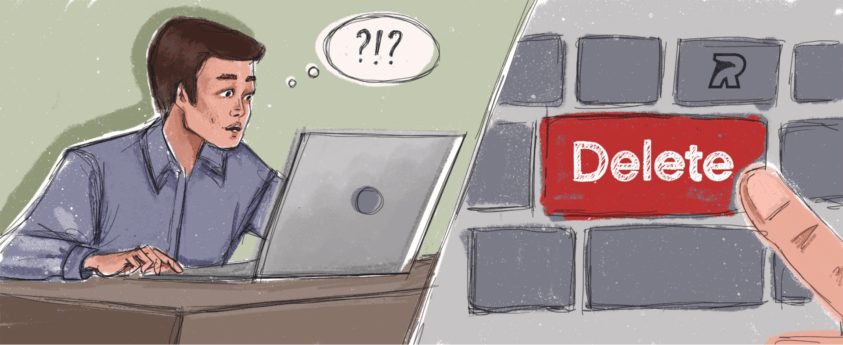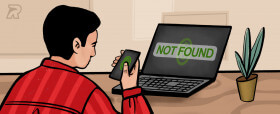What Is Violation Copyright and How to Deal With It?

Infringement of copyright is a serious and pressing problem that can get in the way of successful business development. Let’s figure out what it really is and how to deal with it correctly.
Copyright is a type of intellectual property (IP) protection established to protect inventors’ exclusive right to original works as their own. Copyright grants the owner or creator a number of exclusive rights to use and distribute the work under specified conditions, with exemptions for public use.
План статьи
Don’t let violation copyright harm your business
It’s free, confidential, and without obligation
Individuals and businesses who create new works and register for copyright protection do so in the hopes of profiting from their efforts. For example, a small firm that wants to use an image or a piece of music in its advertising must either buy the rights to the works outright and get an assignment or purchase a license to use them for a specific purpose.
The United States Copyright Act of 1970 was established to safeguard original work from unlawful use or copyright infringement. Despite federal legislation, copyright violation, both deliberate and unintentional, can and does happen frequently.
What Is a Violation of Copyright?
Infringement of copyright is the use of copyrighted works without permission in the event a copyright holder is required to use, therefore violating the right of the holder to copyright, reproduce, distribute, or execute the protected work or do derivative works. The copyright holder refers to the work’s owner, a publisher, or another business to whom copyright has been granted.
Copyright violations cost American businesses an estimated $28 billion per year. Substandard counterfeit items come from copyright breaches, resulting in lower-quality consumer goods. The United States loses tax revenue due to unlawful counterfeit sales, and it also has to spend money on copyright enforcement.
Copyright infringement is a federal offense under the United States Copyright Right Act. It empowers harmed parties to sue copyright violators in civil court for monetary damages. The following are the legal consequences of violation of copyright laws:
- The infringer must pay the whole amount of damages and profits, which can be between $750 and $30,000 per item of work infringed upon.
- The law stipulates a monetary civil penalty ranging from $200 to $150,000 for each work infringed upon.
- All legal fees and court costs are to be borne by the infringer.
- The court has the authority to impose an injunction to stop the infringing behavior.
- Criminal copyright infringement penalties can go up to $250,000 in fines per offense and up to five years in prison.
The DMCA (Digital Millennium Copyright Act) copyright law was created to address copyright violation that occurs online. It protects internet service providers who have content on their sites from liability for copyright infringement. They are protected if they remove the offending information quickly after being notified of an alleged violation by the copyright owner or their designated agent.
How to Spot a Copyright Violation
Sometimes you may unintentionally violate copyright and get yourself in trouble. These tools will help you to spot whether you have stolen the intelligence property or not.
Google reverse image search
Reverse image search on Google is a valuable tool to detect an image copyright violation. Open Google Image Search, click the camera icon, search for the image’s URL or paste the image to see if it’s available elsewhere online. You should be able to determine ownership information based on Google’s image findings.
Copyscape
This tool can instantly compare the text you’ve written to any previously published information within a few moments. The comparison tool will spot duplicate content and tell you how much of your content matches the already published one. It also offers a free guide on avoiding plagiarism.
Siteliner
This is a fantastic tool that can examine your entire website for duplicate material once a month. It can also detect broken links and identify the pages that are most visible in search engines.
Eproves.com
eProves is an online platform that checks YouTube music for copyright. It’s freely available and doesn’t require any registration.
Examples of Copyright Infringement
Below are some of the copyright violation examples:
- Recording a film at a movie theater and publishing it online
- Using copyrighted phrases or music in a video on your firm’s social media pages
- Without the consent of the copyright or license holder, downloading licensed software from non-authorized sites
- Using copyrighted music tracks from a musical group on your firm’s advertisements and campaigns
- Modifying and using a copyrighted image and publishing under your or your company’s name
- Making products with copyrighted words or images and selling them
- Sharing and downloading MP3 music, games, or movies without paying for them
- Without permission or prior consent, copying any literary or artistic work
If your business idea is based on unauthorized content usage, you’ll lose much more than just profits. Take Napster, a website for online music, as an example. It allowed music files to be shared peer-by-peer throughout its network. Customers would freely exchange and download music from various artists. Record labels, however, weren’t fascinated with the idea. They sued Napster for copyright infringement and won.
How Does Copyright Violation Undermine Your Businesses?
Many small businesses are founded on their creators’ creative ideas and works. For example, a self-employed web artist or designer can use a portfolio of drawings and sketches to attract clients and generate more revenue.
Copyright violations, however, can undermine all the efforts. For example, if someone steals your portfolio and presents it as their own, your online reputation is threatened: customers who find your works in another source may eventually consider the plagiarizer as an authentic creator or will merely abandon you both.
A Safe and Affordable Way to Tackle Copyright Infringement
Over the years, many copyright infringement problems have been raised. The DMCA Office has been battling an increasing number of concerns due to rapid improvements in technology and is unable to keep up and address the violations quickly.
When your copyrights are violated, and the content has been copy-pasted to other websites, you typically think about a legal trial as the only solution. Sometimes, it is. Suppose you are in the same situation as photographer Art Rogers, who took a picture of a couple holding a row of puppies and sold it for use on greeting cards and other merchandise. Then, he found out that renowned artist Jeff Koons came across the photograph and utilized it to build a group of statues based on it. Koons did make a lot of money on Rogers’ work but lost more when he was sued for copyright violation.
Rogers had to spend a lot of time and money on lawyers to claim his work back. In a digital world, however, there are other, faster, simpler, and safer ways to claim your rights – reputation management.
While courts require months and thousands of dollars, Reputation America can solve the problem much faster, with guaranteed results, and without extra hassle and publicity – we can delete the copy-pasted content, deindex it, or update it.
With more than ten years of hands-on experience, our team knows how to find stolen content on the web and deal with it: we reach out to Google, content authors, site admins, and hosting providers when reporting copyright infringement and removing the infringed content.
In the case of DMCA violation of copyrights, we issue DMCA takedown requests to hosting companies and Google; in other words, we request the content removal from Google Search (and other search engines) and the site itself. We also issue notices for DMCA copyright infringement to websites, search engines, and hosting providers and keep you up to date on the status of DMCA takedowns and new infringements.
You can use our services to:
- Keep your copyright protected
- Stop pirates from stealing your content
- Boost your earnings by eliminating copy-pasted content
- Focus on your craft with your mind at ease
- Save energy and effort by not running around courts to fight cases
A copyright violation is a significant problem that doesn’t only undermine your efforts but also poses serious reputation risks. While you can try to deal with it yourself, it’s always better to delegate the task to professionals who will deliver guaranteed results and let you focus on strategic business activities. Partner with Reputation America today to protect your intelligent property.

Still have questions?
It’s free, confidential, and without obligation






У этой статьи пока нет комментариев, но вы можете быть первым